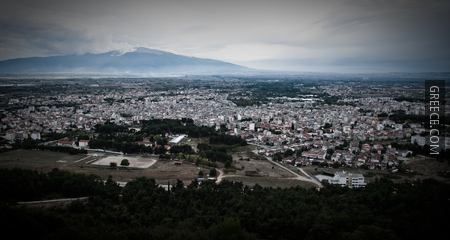General Information on Drama
The prefecture of Drama is a land of valleys and mountains with alpine shelters and ski resorts. The homonymous capital is a very verdant city due to the abundant water that flows through it.
The city is located at the foot of Mountain Falakro, which means “bald mountain”. The settlement itself is not very beautiful, but the mountain and the surrounding area are incredible. Ski slopes and well-equipped shelters for climbers, Mara’s cave with stunning stalactites, the wonderful forest of Elatia and many small picturesque villages are in close distance from the town.
History of Drama
There are a number of theories regarding the origin of the name. Drama was possibly inhabited by Thracians. This is supported by inscriptions mentioning Thracian names that were found in the city. The name Drama means a place near hills and a water source. The most popular claim is that it comes from the word Ydrama, a place with many water springs.
The first traces of human presence in the Prefecture date back to 30,000 years according to finds that have been discovered in the cave at the river head of Angitis. Archaeological excavations showed that gradual steps towards civilization have been taken in the Drama region since 5000 B.C. The historical periods of Drama are divided in the prehistoric period, the Thracian period, the Macedonian period and the Roman period.
From the beginning of the 7th century B.C., with the founding of the southern Greek colonies on the island of Thassos and along the coast of Macedonia, the Greek world started to penetrate inland into the area that nowadays is the Prefecture of Drama. Thracians occupied the area and were followed by Athenians, Macedonians and finally Romans. The Macedonians appeared in the region in about 356 B.C. and, according to inscriptions that were found, an intense immigration of Romans to the area took place at that time. Later, when Christianity prevailed, Drama played an important role in the whole area. During the Middle Ages, barbarians from the north of Europe settled the area, mingling with the population. The Byzantine period in Drama begins with the division of the Roman Empire into the eastern and western section. Because of constant attacks from Bulgarians and Slavs, the Byzantines built the wall of Drama.
In 1206, the Franks of the 4th crusade conquered Drama and remained in the area until 1223, when it was recaptured by the Byzantines. In the Late Byzantine period, the citadel and the surrounding land, though repeatedly overrun by Latins and Bulgarians, remained Byzantine from the middle of the 13th century until it was conquered by the Serbs in the middle of 14th century. In 1346, Drama came under the rule of the Serbian sovereign Stephan Dusan. From 1355 to 1374, Drama was recaptured by the Byzantines. In 1383, the town was conquered by the Ottomans and its population mingled with Turkish colonists from Anatolia. Its prosperity, thanks to the cultivation of rice and cotton during the 17th and 18th century, increased even more in the 19th century, with the growing and trading of tobacco. During the 1820s, Greeks from different areas, mainly Epirus, Western Macedonia, Chalkidiki, Constantinople, and Kappadiokia of Asia Minor, came here, further contributing to its economical development. During the end of the 18th century and the beginning of the 19th century, the people of Drama, most of them Christians and of Greek origin, took an active part in the Macedonian Struggle, to gain their freedom and to unite with the free Modern Greek State. However, in 1912, the city was overtaken by the Bulgarian army, and was freed one year later by the Greeks. After the Asia Minor catastrophe of 1922, Greek refugees from Asia Minor, Pontus and Thrace came to Drama and gave a new identity to the city, which is still present. During World War II, Hitler’s Germany ceded administration of the region to Bulgaria. After an unorganized act of resistance, the Greek population of Drama was massively butchered by the Nazis. The city was liberated in October 1944, when the Bulgarians and Germans lost the war.
How to Reach Drama
Coach: KTEL coaches link Drama daily to other major cities of Greece, including Athens, Thessaloniki and Alexandroupolis. Train: Drama is also connected to major cities like Athens, Thessaloniki and Alexandroupolis by daily train services. Air: Drama is served by the airport of Kavala - Chrysoupoli, 68 km away, with domestic and international flights.
Top 10 Destinations in Drama
All Destinations in Drama
Map of Drama
 Athens Photos
Athens Photos
 Santorini Photos
Santorini Photos
 Crete Photos
Crete Photos
 Meteora Photos
Meteora Photos
 Corfu Photos
Corfu Photos




































